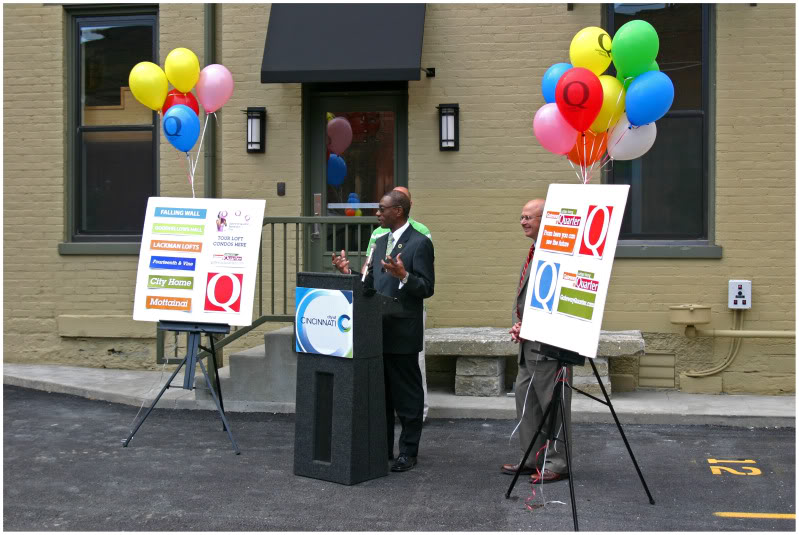The City of Cincinnati will announce proposed amendments to its tax abatement program for buildings built in adherence to Leadership in Energy and Environmental Design (LEED) standards. Sponsors of the changes say that the amendments will further incentivize developers to reach for even higher LEED certifications.
“I think this change by the City will convince people to invest a little more upfront to get to a higher LEED level,” Marc Hueber, president of John Hueber Homes, which has built 22 LEED-certified homes in Cincinnati, stated in a prepared release.

Mayor Mark Mallory (D) makes a statement at the ribbon cutting for Over-the-Rhine’s first LEED certified residential project in 2009. Photograph by Randy Simes for UrbanCincy.
First approved in 2009, Cincinnati’s incentives offer a 15-year, 100% tax abatement valued up to $562,792 on new residential construction; and a ten-year tax abatement on improvements up to a maximum of $562,792 market value, and are considered to be among the most generous in the United States.
Once of the constant criticisms, however, of LEED incentives is that builders go after low-hanging fruit and end up more often than not developing properties at lower LEED levels. Cincinnati’s present incentives do work to combat that by removing the value limit for new and rehabilitated residential structures that achieve LEED Platinum certification.
“My family invested in building a LEED Gold home in Cincinnati in 2011, so I’m aware of how tweaking our LEED program will benefit consumers and our entire community,” said city council member Laure Quinlivan (D), who sponsored the changes.
Community leaders will gather with members of the development community tomorrow in Northside at 10:30am to announce the proposed changes, and city officials will be on-hand to answer any questions about the amendments to residential and commercial abatements.
Following the announcement, council member Quinlivan says that she intends to bring up the amendments in City Council’s Strategic Growth Committee at noon, and act to implement the changes at that time.
“The City of Cincinnati’s LEED tax abatement is an innovative model—and currently unparalleled in scope—to support energy and resource efficiency in homes and buildings,” says Doug Widener, director of community advancement for the United States Green Building Council (USGBC). “The program serves as a model for other cities and the proposed changes ensure that it remains at the forefront of such municipal efforts nationally while continuing to drive conservation and innovation locally.”
